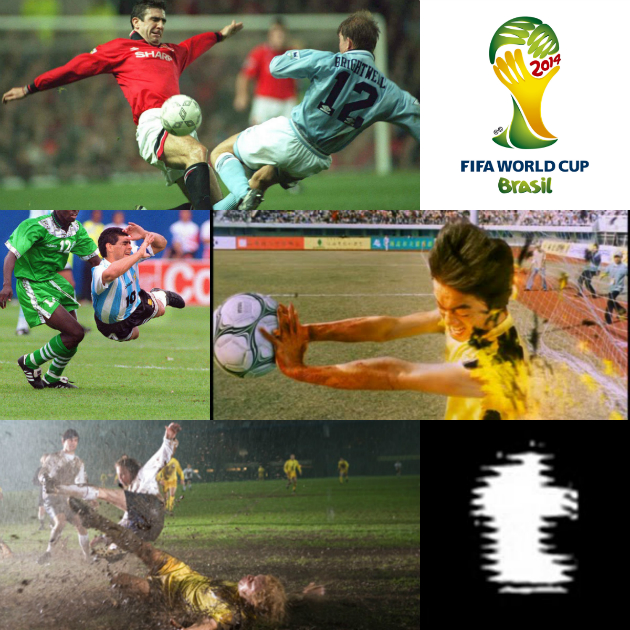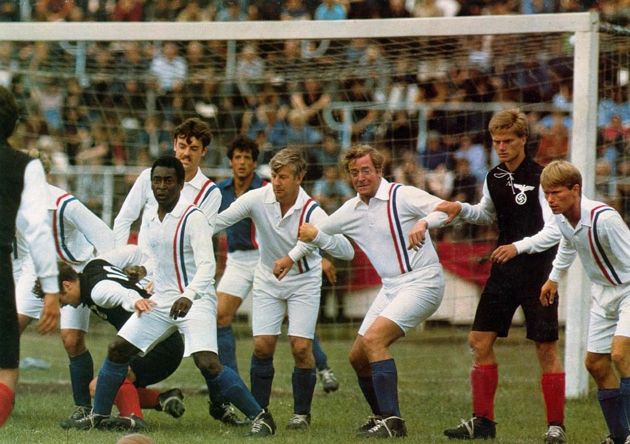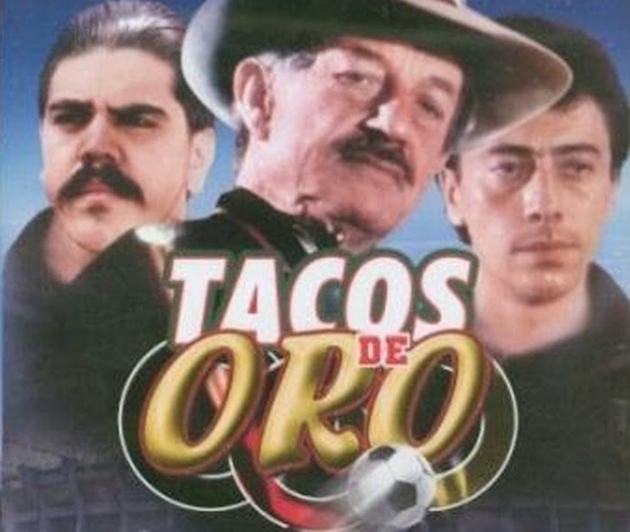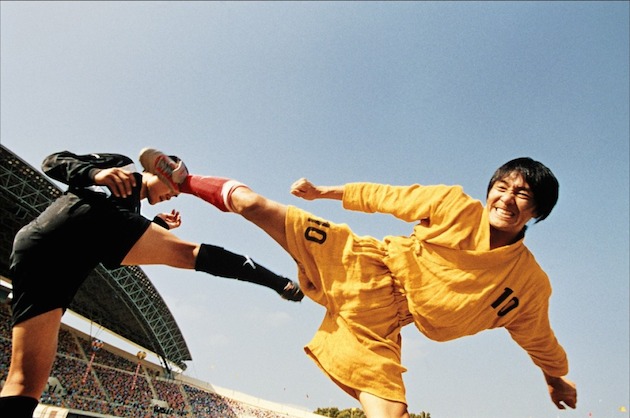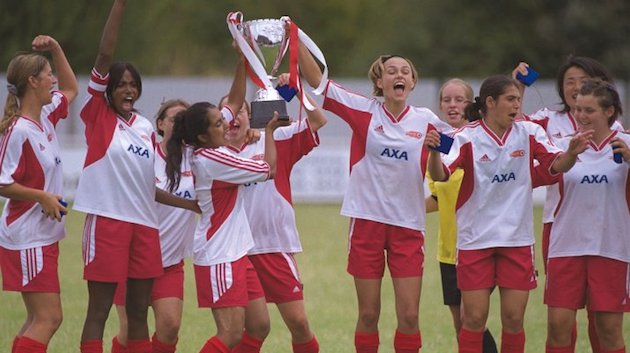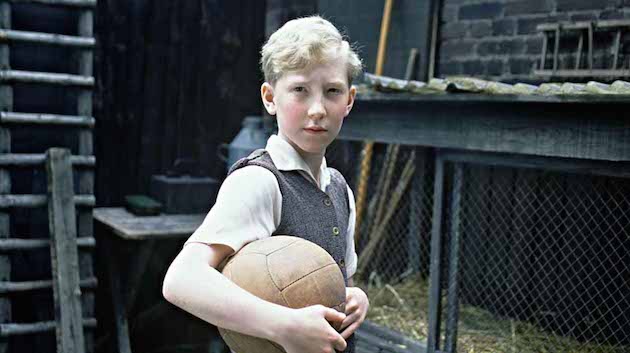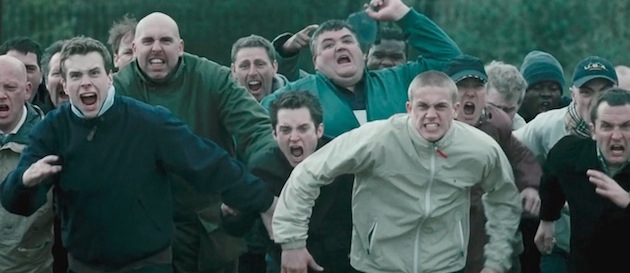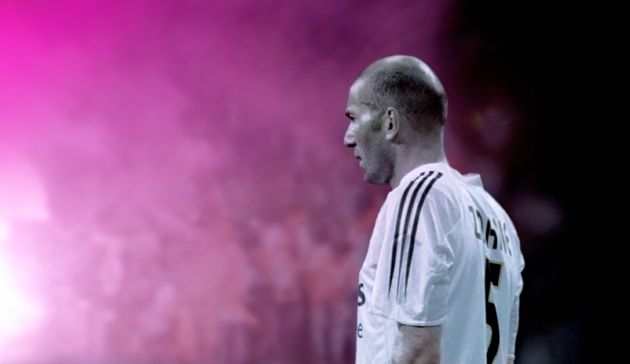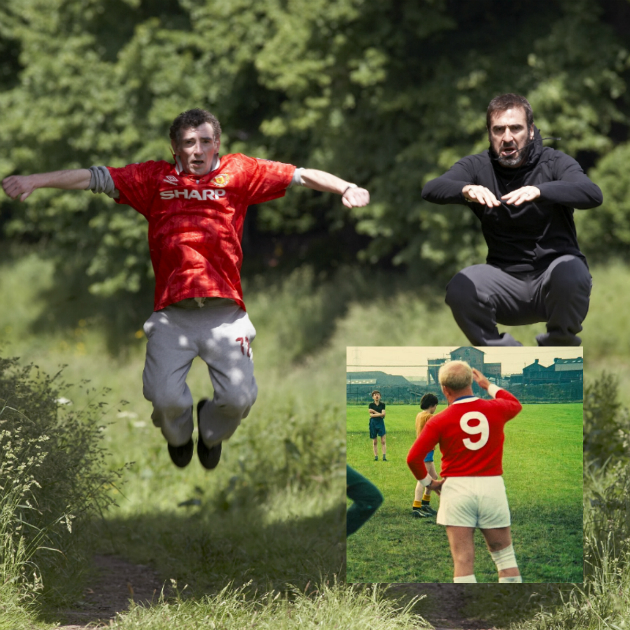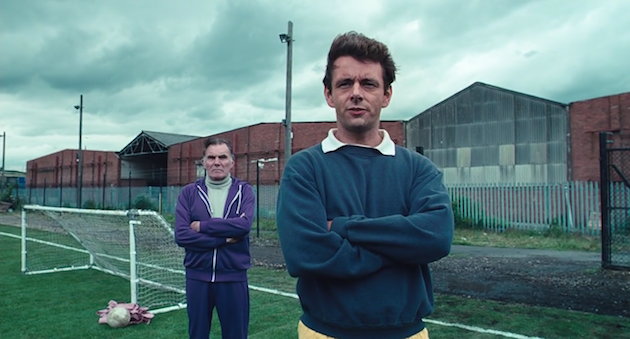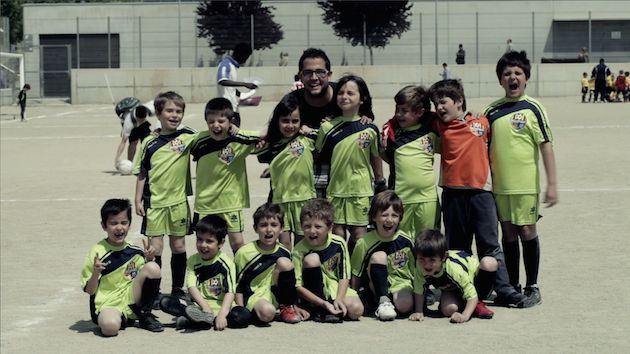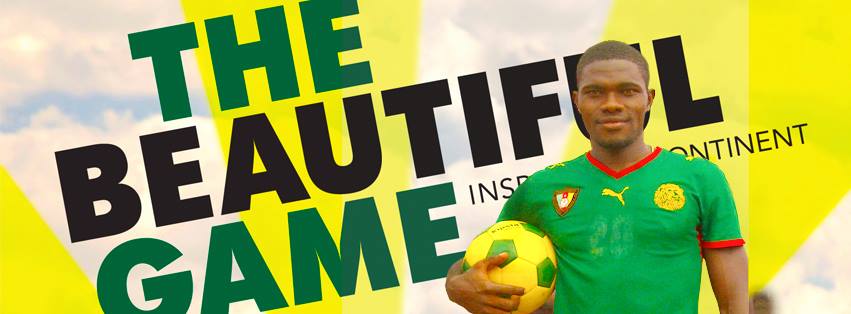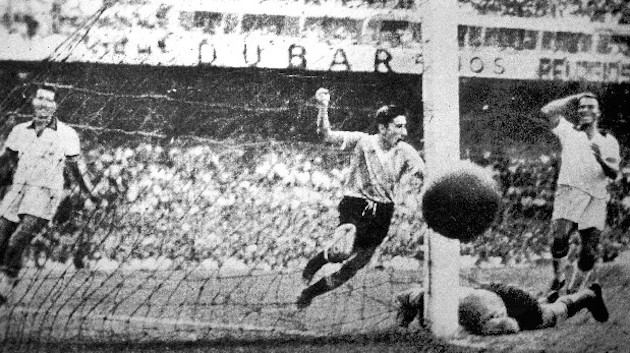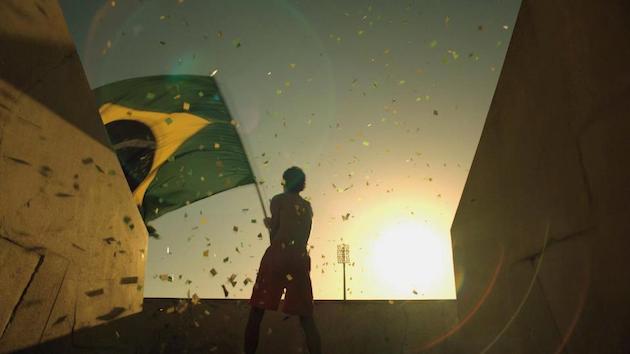After the long four-year wait, today is the day for a new World Cup to kick off.
It's a very particular edition for football's major event, as the world's top champion, Brazil, is the host country for the first time since 1950 (when the famous "Maracanazo" happened). At the same time, incredibly immense complaints against this year's Cup have been an everyday thing and, hopefully, won't be ignored during the next month. Brazil 2014 means both football and serious sociopolitical problems.
For the ScreenAnarchy gang, it is also a perfect excuse to talk about some of the most remarkable cinematic efforts that have taken the world's most beloved sport as subject of exploration. We have put together a list that answers to a simple question: which are your favorite football films? The picks were made by six contributors, aside of myself, and are displayed in the gallery below. Dramas, comedies, documentaries, and even a short film are included. Feel free to chime in with your own personal favorites!
Shelagh Rowan-Legg, Ryland Aldrich, Stuart Muller, Kwenton Bellette, Ernesto Zelaya Miñano and James Marsh
contributed to this story.

















Escape to Victory (aka Victory) (John Huston, 1981)
By James Marsh
Arguably the most star-studded football film of them all is John Huston's preposterous but hugely enjoyable World War II POW epic, Escape To Victory, which sees a ramshackle team of allied prisoners of war cajoled into a high stakes match against a team of German officers in Nazi-occupied Paris. Fortunately for all concerned, the allies can count a number of world class players among their number.
Michael Caine plays John Colby - England's national team captain before the war - who agrees to field a team against Max Von Sydow's German officers for an exhibition match. The event quickly becomes a propaganda stunt for the Nazis, while Colby's superior officers force him to use the game as an attempt to stage a daring escape attempt. This involves tunnelling out of the team changing room during half time and reluctantly including American POW Hatch (Sylvester Stallone) in Colby's team.
A number of Ipswich Town players were employed by Huston to make the football scenes more authentic, but the real highlight of Escape To Victory is seeing international stars of the sport like Pele, Bobby Moore, Ossie Ardiles and Soren Lindsted in action. Their acting might not always be up to the task, but there's no denying their skills on the ball. The result is an enjoyable war-time romp, with Caine and Stallone frequently butting heads over tactics and Hatch's general lack of footballing prowess, but the real scene stealer has to be Brazilian Pele, for the moment when he outlines his tactics for winning the game: "I go like dis, like dis, like dis, like dis...goal."
Chido Guan, El Tacos de Oro (Alfonso Arau, 1986)
By Eric Ortiz García
The first movie of this fine selection has the quintessential storyline in a sports feature; that of the humble kid, the underdog who, after a series of problems, ends living the dream (of playing professional football, in this case).
In Chido Guan, El Tacos de Oro, we are in Mexico prior the 1986 World Cup. Our protagonist lives in one of the humblest barrios of Mexico City, where he is known as “el chido guan.” It’s hard to explain how that nickname works, let’s just say “chido” means cool and “guan” actually refers to the English number one. The language displayed in Alfonso Arau’s picture couldn’t be more Mexican; gacho, chale, cabula and neta are words used normally nowadays, though definitely associated with the barrio. In the movie, for example, “el chido guan” and his friends are the only ones who talk like that.
The social class thing is very present and in one scene, we see the protagonist’s girlfriend selling toys of the World Cup’s mascot (Pique) in the street. Things will get better for them thanks to the skills “el chido guan” has for soccer and to the help of his mentor, the former footballer with a tragic past Salvador (played by the legendary Mario Almada). There’s some struggle, of course, as “el chido guan” quickly gets lost in success, leaving his job (even if he’s not making a lot money in football), and forgetting the barrio, his pals, girlfriend, and - very sick - mother. Also interesting is that the film touches the corrupt and corporate side of Mexican football.
Bottom line: forget about El Chanfle (a 1979 Mexican football movie) and check this one out instead!
Shaolin Soccer (Stephen Chow, 2001)
By Eric Ortiz García (also chosen by J Hurtado)
Again, it’s the classic story, with a former great footballer turned mentor of a group of underdogs, who don’t really know much about soccer. However, this time kung fu is involved and the results are unlike anything else. Highly re-watchable, bloody hilarious, and just plain awesome, Stephen Chow's Shaolin Soccer is still my all-time favorite football film. Just go and watch it!
Bend It Like Beckham (Gurinder Chadha, 2002)
By Shelagh M. Rowan-Legg
Bend It Like Beckham is that wonderful and too rare combination of film that manages to combine social issues of racial relations and gender stereotypes with mainstream comedy-drama appeal. Jess (Parminder Nagra) is a first-generation daughter of Sikh immigrants; but unlike her sister, whose only goal is to marry the man she loves, Jess wants nothing more than to play football. She has to balance family obligations, cultural expectations, a budding friendship with fellow footie player Jess (Keira Knightley, in her breakout role) and romantic feelings for her team coach Joe (Jonathan Rhys-Meyers).
There is a grand tradition of British social realist cinema that deals with issues such as immigrant integration, interracial romance and women trying to make it in a ‘man’s world’. Director-writer Gurinder Chadha combines great footie scenes (which, while noting that these are girls playing, never sexualizes them) with a punchy soundtrack, with a realistic look at how first generation children negotiate cultures. It (mainly) keeps on the lighter side without being superficial or unrealistic. Maybe not the most original theme, but the film is a delight of colour, sound, performance and story.
The Miracle of Bern (Sönke Wortmann, 2003)
By Eric Ortiz García
Post-war Germany and Switzerland during the 1954 World Cup are the settings for this remarkable period piece.
Little German boy Matthias is an aficionado of a local football team, for which his friend and role model Helmut Rahn plays. Prior to the World Cup, Matthias’ real father finally comes home from war, after almost eleven years. Meanwhile Germany’s national football team, with Rahn as a member, fights their way in the World Cup as a dark horse, Matthias and his family will face a complete change in their lives thanks to the father’s rigidness.
The Miracle of Bern works as social realism drama, with the old machismo confronting the more flexible, but still responsible, manner that Matthias’ mother used to raise her kids. The older brother of Matthias is, for example, a paid musician, yet for the father he’s nothing but a communist. The film is very complete as a character piece and, little by little, the old man is seen struggling with his own demons, while the rest of the family try to understand what is like to be far away from home for an entire decade. Not an easy position for anyone.
Throughout, there are hints of real football passion; Matthias gets angry if his team loses, the priest talks about soccer, etc. This is, indeed, a movie that shows a paralyzed country during a World Cup. As a period piece, it’s really, really interesting as, for instance, the German players need monetary compensation in order to leave their regular jobs and play for their country. Hell, Germany was an underdog team! Many things have changed since 1954, obviously.
This is much more than just a recap of Germany’s road to their first ever World Cup championship. We get to see what happens before and after the matches, how players feel after a particular scandalous defeat, as well as a minor subplot that involves a sports journalist and his wife. There’s only one big football match sequence, and it’s damn good; in general, the film is technically brilliant.
The Miracle of Bern is, ultimately, a feel-good picture, exposing what Germany’s win really meant for an entire country.
Goal! (Danny Cannon, 2005) & Goal II: Living the Dream (Jaume Collet-Serra, 2007)... but definitely not Goal! III.
By Ryland Aldrich
As a sports and film fan coming late to 'the beautiful game,' I made a point to watch all the soccer movies I could when I was bit by the futbol bug a handful of years ago. This led me to the excellent Goal! trilogy -- the third installment of which I will maintain has yet to be made.
The first film, Goal! (or Goal! The Dream Begins as it was titled in the USA) starts the story of Santiago Munez (Kuno Becker) as he travels from the mean streets of Los Angeles to the muddy pitch of Newcastle United and learns how to be a star in the English Premier League. The follow-up, Goal II: Living the Dream, finds Munez transferred to Real Madrid where his star continues to rise at one of the world's top teams. But with the spotlight brings turmoil in his personal life and Munez's future is left in question at the middle installment's cliffhanger conclusion.
Both of these films feature excellent technical merits and very competent writing and acting. Most importantly for soccer fans, the films are packed with cameos from some of the world's most famous footballers, including Zinedine Zidane, David Beckham, Cristiano Ronaldo, Iker Casillas, Steven Gerrard, Thierry Henry, and many more. This 'Where's Waldo' element paired with some great soccer sequences make these two films pure joy for fans, and left everyone hungry for the trilogy's conclusion.
But then tragedy struck...
Goal!'s successful $4M US and $23M international box office was followed up by Goal 2's anemic $225k domestic and $7.8M international haul. Plans for a big budget Goal 3 were scrapped and Goal 3: Taking on the World was quietly produced (in someone's basement) and slipped out on DVD in the UK a few years later. In the film, Becker's Santiago Munez only appears in the first few minutes to clumsily wrap up his cliffhanger ending and then hand the extinguished torch over to some new characters that no one cares about who dance around a bit and pretend they are in a real movie. Most notably, the high technical merit and sweeping stadium shots of the first two films are replaced with straight-to-DVD aesthetics and a budget equivalent to the on-screen drivel.
Fans of the Goal! series have denounced the film with online petitions springing up demanding the film be remade. Five years on it seems pretty unlikely we'll ever get a true conclusion to the trilogy, but hey, if the popularity of soccer continues to rise in the US, you never know who might step in with a late stoppage time winner.
Green Street Hooligans (Lexi Alexander, 2005)
By Stuart Muller
Green Street Hooligans is one helluva treat for the screen!
I personally remember it as the film that cemented Frodo's transformation into Elijah Wood. I know, I know; Wood has been making films since before he was born (93 acting credits, and counting). However, I've never seen any of his work prior to The Fellowship of the Ring, with one exception: Forever Young. I was primed to like the film when I eventually saw it because Mel Gibson had already won my allegiance for life with Braveheart (that first viewing at age 16, balls deep in heroic fantasy and D&D, remains the most overwhelming cinematic experience of my life). What I wasn't expecting was to discover my quintessential Frodo Baggins, in a young child no less. Wood was still just a kid in Forever Young, but the moment I saw him he became, to my mind, synonymous with Frodo; wide-eyed innocence, somewhat serious, and exuding an authenticity of spirit (even at so young an age). You can, perhaps, imagine my joy at watching him grow up and, a decade later, literally slip into the hallowed hairy feet I'd imagined him in 10 years. It's no wonder I'm a hopeless romantic.
Green Street Hooligans, however, is almost maliciously unromantic; it's a serious, jarring film about the potency and folly of violence. It was Elijah Wood's first role following Frodo, and as he no doubt hoped, it crushed the hobbit typecast (with a little help from his deliciously cannibalistic sojourn in Sin City, immediately thereafter). This film single handedly broke my equivalence between Elijah Wood and Frodo, to the benefit of my appreciation for both. I now find him an intriguing person and a challenging actor, and I don't find him looking out at me through Frodo's eyes whenever I watch The Lord of the Rings.
His role in Green Street Hooligans, as Harvard expellee Matt Buckner, sees him rise from a personal nadir by descending into the violence of football hooliganism. His connection to the football "firm" - a gang of supporters (hooligans) who wage physical battle against opponent firms - is firm-boss-cum-history-teacher Pete Dunham, played to riveting effect by Charlie Hunnam (though I gather actual Cockneys find his accent godawful). The film is in fact brimming with great performances in a number of supporting roles, by the likes of Marc Warren, Leo Gregory, and Geoff Bell, not to mention the ever intoxicating Claire Forlani.
Truth be told, there isn't much actual football in this film. The one scene shot at a packed live game is wonderful - visceral! - but football is more of an ether in which the story unfolds than a character within it. Football games mark the passage of time and delineate the crescendo; football fuels the passions that drive these men to savagery; and football holds it all together despite the entropic violence.
And did I mention that director Lexi Alexander was a former World Karate and Kickboxing champion? It shows in her direction of the street battles, which are tangible and taught and terrific. Much like the film itself.
Zidane: A 21st Century Portrait (Douglas Gordon/Philippe Parreno, 2006)
By James Marsh
Using 17 cameras, all trained on the controversial figure of France and Real Madrid legend Zinedine Zidane, Gordon and Parreno create a singular cinematic experience. The film attempts to break down the unique style of one of the game's most flamboyant players, but also paint a larger picture of the footballing experience and our notions of celebrity. The featured game was Real Madrid's 2005 La Liga clash with Villareal, and in an ironic twist of fate, the volatile Frenchman earned himself a red card in the game's dying minutes, and was sent off.
An experimental work to be sure, but a notable one, if only for the incredible score from Scottish post-rock band Mogwai.
Maradona by Kusturica (Emir Kusturica, 2008)
By Eric Ortiz García
Diego Armando Maradona is, for my money, the greatest football player of all time. Emir Kusturica, on the other hand, is definitely one of the great European filmmakers (and musicians), so the combination of these two geniuses couldn’t go wrong. And it did not, at all.
I wouldn’t say Maradona by Kusturica is a perfect documentary, but it is unique, personal, and kind of unforgettable. From the moment you see Kusturica (and the crew) in Buenos Aires, waiting for Diego, and eventually being sort of ignored by the Argentinean “God”, well, you know this is not your usual doc. After all, we are dealing with the “Sex Pistol” of soccer and not with FIFA’s protégé, Pelé!
Maradona talks deeply about his drug addiction and regrets here, and Kusturica captured some moving moments involving Diego’s family. The film also explores the meaning of Maradona’s actions as a player. What did scoring two goals to England really represent to Argentina, back in 1986? What did it mean to take Napoli, a team from Southern Italy, to the top of Europe? With Maradona, football is more connected to society than ever.
Filmed from 2005 to 2007, the documentary has also a political side attached, beginning with some footage of an anti-George W. Bush manifestation (“he’s human scum”, says Maradona). At the same time, it’s pure joy for the football aficionado, with a nice dose of Diego’s best plays, and other special (and damn crazy) bits that I just can’t spoil.
Looking for Eric (Ken Loach, 2009)
By Eric Ortiz García
I think this is the only fiction in the list without actual football, aside of the footage it uses. In fact, Ken Loach’s brilliantly affecting Looking for Eric is often not about the sport.
In it, we have Eric Bishop as protagonist, a British postman and hard-core Manchester United aficionado who’s facing a life crisis. His present is as problematic as it gets. He lives only with his two teenage stepsons, who barely show respect and any sign of real responsibility; on top of that, Eric’s dark past is coming back, more vivid than ever.
Eric often looks back at better times and football is an important part of this melancholia, especially thanks to one player: Eric Cantona. While Bishop still watches on TV the games of the Red Devils, nothing comes close to rooting for Cantona at the pitch and being rewarded with spectacular plays and goals. Cantona himself takes it to another level and his presence is very, very memorable and funny.
Paraphrasing Bishop, Looking for Eric puts football as a scape to all the bullshit in life. Nonetheless, Loach makes you care all the time for the characters (Bishop’s stepsons, daughter, ex-wife, and - hilarious - friends) and their real-life issues.
Loach, by the way, directed the brilliant Kes, and that one does have a football sequence! And it’s magnificent, showing a match between “Manchester United” and “Spurs” in “Old Trafford.” It’s a kids game really and the film’s protagonist, Casper, ain’t too happy about it. He doesn’t like football, can’t afford a kit for the lessons, and has to deal with the brute coach. Still, the sequence is amusing throughout, with the teacher/player/referee as the real star of the match. Kes might not be a football film, but it has one of the most memorable scenes about the sport.
The Damned United (Tom Hooper, 2009)
By Kwenton Bellette
An excellent film that focuses not only on the strategy behind the sport but also the egos. Michael Sheen is brilliant as a conflicted coach who must bring his newly managed team, his former rivals, to victory. The film eschews most cliche moments to deliver grounded albeit thrilling and tense moments.
The film is masterfully directed and portrays the period setting (1960/1970) well. Easily the best film by director Tom Hooper (Les Miserables).
Also chose by Eric Ortiz García
If you ask a kid today about English football, he or she will probably mention Manchester United, Chelsea, Arsenal, or even Manchester City and Liverpool.
The Damned United is, first of all, a detailed period piece, a time capsule that takes you to a completely different era for professional football in England. I’m talking about the late sixties and early seventies, when Leeds United was one of the top squads. Another team that’s not widely known nowadays, but still a two-time English top division champion, is Derby County. The Damned United is also about their journey, from the bottom (the second division) to superstardom (the top league championship).
Coached at the time by Don Revie, Leeds is portrayed as a very, very aggressive team and, in general, the film has a rough feel. We have the great yet dirty and arrogant champions of Leeds, and also the underdogs of Derby County, playing in fields full of mud and leaded by both coach Brian Clough (Michael Sheen) and assistant Peter Taylor. This is an underdog story done with a completely different and realistic approach. After all, its protagonist (Clough) is a great professional with many flaws.
The now Oscar winner director Tom Hooper tackles a football rivalry with a very stylish football match sequence, in which both teams “fight” under the rain, but mostly as a personal character study. First, it is Derby County vs. Leeds, later Clough vs. Revie, and finally Clough against Clough himself and the people who love him (i.e. Taylor). Sheen’s amazing performance and the engaging narrative, moving from 1974 (the year when Clough became Leeds’ coach) to the past and vice versa throughout, make The Damned United stand out as a truly great football film.
The Two Escobars (Jeff and Michael Zimbalist, 2010)
By Eric Ortiz García
I knew about Andres Escobar’s killing, and the involvement of drug dealers in Colombian professional football, but still this great documentary, part of ESPN’s 30 for 30 series, opened my eyes to many other things, through cold facts.
Twenty years ago, O Rei Pelé himself declared that Colombia was the favorite team to win the US World Cup. The South American country had, undoubtedly, a golden generation of footballers; everyone knew such great players as “el Pibe” Valderrama and René Huiguita (though the latter missed the cup)! However, the Colombian squad was a disappointment on the field (losing its first two games), not only reflecting the turbulent times that the country was suffering in the sociopolitical aspect, but being directly affected by that.
After the death (in late 1993) of notorious drug lord, terrorist, soccer fan and (for many people) hero Pablo Escobar, violence in Colombia kept on going, even in a more brutal way, as some persons in the doc recall. The golden years of Colombian football are connected to Escobar’s empire more than anybody would like to image; actually, the golden age happened in great part because of Escobar and other drug lords.
The Two Escobars presents interviews with people who were close to both protagonists; including familiars, Pablo’s hitman, and Andres’ former coach and teammates. It’s the ultimate documentary about the subject and the most shattering football piece I’ve ever seen.
L'Equip Petit (Roger Gómes and Dani Resines, 2012)
By Eric Ortiz García
OK, so this isn’t really a feature but rather a 9-minute documentary. It deals with a team of a kids football league (in Catalonia, Spain) that has never scored a goal. Not a single one. The real problem, though, is that they always end conceding many, many goals, more than twenty sometimes.
The documentary exposes both the thoughts of the children themselves and the adults that surround them, as well as the actual footage of the matches. It’s both touching and funny, with the kids understanding perfectly their situation, reflecting about the why (“we get nervous”, “the rivals are bigger”, “we’ll lose because we always lose”) and dreaming about the day in which they will finally score a goal. One of the cutest short films I’ve ever seen, for sure.
The Beautiful Game (Victor Buhler, 2012)
By Stuart Muller
The Beautiful Game turned out to be the perfect documentary to stoke my World Cup fever. Sadly, my own South Africa didn't qualify this time, with tragic consequences for world football; vuvuzelas will be few and far between in Brazil. Devastating, I know.
In my heart I've known I should care about the upcoming World Cup - big sporting events are wonder filled celebrations of humanity - but I just didn't seem to have any shits to give. Enter, The Beautiful Game; a rejuvenating reminder of football's profound significance in Africa.
The premise is simple; a collection of stories about individuals living challenging lives in Africa, who have been powerfully affected - even transformed - by football. Most of the film follows West African subjects (a longstanding regional powerhouse in African football), and thus fortuitously offers a glimpse into four of the five African countries appearing in the current World Cup; Cameroon, Nigeria, Côte d’Ivoire, and Ghana (Algeria being the 5th).
As the film progresses, it reveals the full context of their stories, and begins to explore how love for the game has uplifted and sustained not just the film's subjects, but countries, and indeed the entire continent. The stories are varied and poignant, encompassing sons, mothers, daughters, and cripples, but interweave and illuminate each other in a way that draws the film together. I found it greater than the sum of its parts.
Throughout the world, football is hope made manifest, but the often especially harsh realities of Africa make hope especially treasured here. Football matters everywhere, but it would be hard to argue that it matters to the human soul anywhere more so than in Africa. This film reminded me why football is beautiful, and why this opportunity for African teams to compete against the world is enthralling.
whips out his vuvuzela BBRBBRBBRRWWWAAAAAAAAAAAAAAAAAAAAAAAHHHHHHHHHHHHHHHH!!!!!!!!!
How to watch The Beautiful Game: Please note that this film is not available on DVD, and is unlikely ever to be. It is, however, currently streaming on Netflix in the US, Canada, UK and Northern Europe, and is showing on BT Sport in the UK and on the AMC/Sundance channel elsewhere in Europe, Latin America and Asia. It will be available for download from the film's website later this summer.
Maracaná (Sebastián Bednarik and Andrés Varela, 2014)
By Ernesto Zelaya Miñano
The 1950 World Cup final, held in the imposing Maracaná Stadium in Rio de Janeiro, will forever be remembered as the “Maracanazo”, when the host was handed an unexpected 2-1 defeat on its home turf by Uruguay.
Directors Sebastián Bednarik and Andrés Varela look back on one of the most infamous moments in the history of the “Beautiful Game” with this fond documentary, which follows both teams during the tournament, thankfully not taking any sides. It became a true David vs. Goliath struggle: the Brazilian team were the favorites and everyone assumed their victory was a no-brainer; and, despite having organized and won the first ever World Cup in 1930, Uruguay was in a slump which was made worse by a player’s strike (Captain Obnulio Varela only agreed to play after he was promised a job in a public office).
Despite all this, Uruguay came out on top and left an entire country eating humble pie; one Brazilian player likens the subsequent years to a prison sentence. It’s a feat the current South American champions have yet to fully live up to.
Made up almost entirely of archive footage with the occasional talking head thrown in, Bednarik and Varela’s film is occasionally repetitive, but, like any good sports movie, it will make you want to cheer for the underdog. Brazil is probably praying that lightning doesn’t strike twice this year.
Mata Mata (Jens Hoffman, 2014)
By Eric Ortiz García
In 2012, Brazilian footballer Dante signed to play for one of Europe’s top teams, FC Bayern München. A year later, he scored his first goal playing for the national team of his country; it was a Confederations Cup match, celebrated in Dante’s own home city, Salvador. Eventually, Dante was selected to play the 2014 World Cup. We are talking about a player who saw his dreams come true in the most perfect way, certainly becoming a figure to emulate for a younger generation of aspiring Brazilian footballers.
The documentary Mata Mata has Dante, now 30, as one of its protagonists. It shows primarily two things: that Dante’s road to success was tough, and that not every talented player in Brazil has the same fortune.
Other particular protagonist is Carlinhos, who gets an opportunity in Europe, as a Bayer Leverkusen player. He’s a teenager about to give his family a much better life, but the reality is not as easy as it sounds. We witness as well the difficulties of growing up in a favela; Thiago “Mosquito” Rodrigues da Silva, for example, is a real football promise whose father is a criminal in prison and his mother and stepdad might not be the best for his professional career.
Ever wondered how the scout/agent thing works? Look no further, as Mata Mata follows the process, has interviews with agents and footage of how they deal with the player and the respective family. Tackling the personal and professional lives of several young athletes, German director Jens Hoffmann has created a doc with something to say, a gate to Brazilian society and to the football business itself.

Around the Internet
Recent Posts
Now Playing: SCREAM 7 Not So Scary, GHOST ELEPHANTS Not a Myth
Leading Voices in Global Cinema
- Peter Martin, Dallas, Texas
- Managing Editor
- Andrew Mack, Toronto, Canada
- Editor, News
- Ard Vijn, Rotterdam, The Netherlands
- Editor, Europe
- Benjamin Umstead, Los Angeles, California
- Editor, U.S.
- J Hurtado, Dallas, Texas
- Editor, U.S.
- James Marsh, Hong Kong, China
- Editor, Asia
- Michele "Izzy" Galgana, New England
- Editor, U.S.
- Ryland Aldrich, Los Angeles, California
- Editor, Festivals
- Shelagh Rowan-Legg
- Editor, Canada


